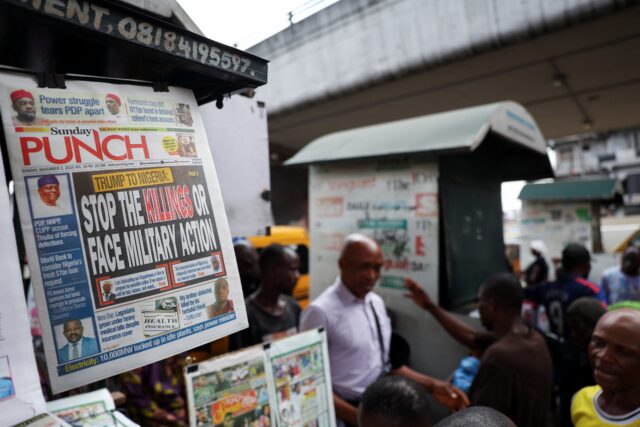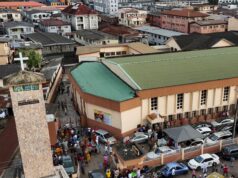
Nigeria’s return to the U.S. list of countries of “particular concern” over Christian persecution has drawn mixed reactions from church leaders and triggered a heated debate in Africa’s most populous nation.
President Donald Trump announced the designation Oct. 31 to protect Christianity, which he said was “facing an existential threat in Nigeria.” He also threatened to halt all aid to Nigeria and launch military action, upon the government’s failure to stop the killings. He later instructed the Department of Defense, which he has nicknamed Department of War, to prepare for possible “action.”
“Thousands of Christians are being killed. Radical Islamists are responsible for this mass slaughter,” the president posted on Truth Social.
Some Nigerian Christians welcome the move, while some fear a negative impact on interfaith coexistence in the country with an almost equal number of Christians and Muslims.
Bishop Mathew Kukah of Sokoto, one of Nigeria’s northeastern regions, which has endured the most of the violence, cautiously welcomed the development, while warning against emotional reaction to Trump’s declaration.
“I have not had time to study the full details of the statement, but we must wait to see its outcome. Let’s see what lessons can be drawn from this development for our national growth,” Bishop Kukah was quoted as saying in Nigeria’s Sunday Punch newspaper on Nov. 2.
Nigeria’s religions divide the country roughly in half, with Muslims — living mainly in the north and accounting for 50%-55% — and Christians, who live in the south and account for 35%-50% of the over 230 million people.
On Oct. 21, during the presentation of a major study — Religious Freedom Report — by the pontifical charity Aid to the Church in Need, Bishop Kukah urged against redesignation of Nigeria as a country of particular concern, warning that the move would undermine ongoing initiatives started to address challenges of religious freedom in the country.
The bishop said he believed that the redesignation would make it harder to work on interreligious dialogue within the country, according to Punch newspaper. The bishop warned the redesignation would “increase tensions, sow doubt, open windows of suspicion and fear and simply allow the criminals and perpetrators of violence to exploit.”
But Father Augustine Anwuchie, a Nigerian Fidei Donum priest from the Diocese of Enugu, feared that the country would never win the war against terror as long as the current government was in power.
The priest, who currently serves as a missionary in the Diocese of Maradi, in Niger, accused the current Nigerian government of harboring within the ruling All Progressives Congress party, using terror as a tool of political control and survival, and thriving on fear and chaos.
“If the United States and other international actors did not begin to hold Nigeria accountable, Tinubu and his … cohorts would continue sacrificing Nigerians to terrorism, while plotting their next tenure,” he told OSV News in a remote conversation on Nov. 3. “The nation burns, while the leaders dance in the flames,” he said of his homeland, Nigeria.
Several Islamist militant groups have a presence in Nigeria’s north. The main groups are Boko Haram and the Islamic State in West Africa. Recently, smaller terrorist groups have emerged and begun fighting for their territories. Members of the Fulani herders, a predominant Muslim ethnic group, have also caused great damage in Nigeria’s Middle Belt region.
The belt is occupied mainly by Christian farming communities. Between 2019 and 2023, the Fulani were accused of causing 55% of the deaths recorded among Christians.
The latest report by Intersociety — Catholic-inspired nongovernmental organization — revealed that an average of 32 Christians are killed in Nigeria every day. The report published in August indicates that as many as 7,000 Christians were massacred across Nigeria in the first 220 days of 2025.
It said at least 185,000 people, including 125,000 Christians and 60,000 moderate Muslims had been killed in Nigeria since 2009 when Boko Haram began its murderous campaign intended to set up a caliphate across the Sahel.
Emeka Umeagbalasi, director of the organization, told OSV News in September that what’s happening in Nigeria is similar to what happened in some regions that were once defined by Christianity and later were emptied of it.
“If the trend continues, Christianity could be wiped out from Nigeria by 2075,” Umeagbalasi told OSV News.
Moderate Muslims are also targeted by radical Islamic groups. However, as the Open Doors Christian advocacy group has pointed out: “More Christians are killed by the extremists than Muslims — given the relative population size of Muslims and Christians in northern states.
“In fact, if you are a Christian, you are 6.5 times more likely to be killed than a Muslim and 5.1 times more likely to be abducted. This does not make the suffering of a Muslim less tragic; it just makes it less likely,” Open Doors said.
On Nov. 2, for its part, the Orthodox Public Affairs Committee, or OPAC, commended the U.S government for the renewed commitment to confront the ongoing persecution of Christians in Nigeria.
The organization said it was encouraged that the government had heard its longstanding appeals and its call for decisive action.
“The suffering of Christians in Nigeria has persisted for far too long,” said George Gigicos, chairman of OPAC in a statement. “We are deeply grateful that the Trump Administration has recognized the gravity of this crisis and has rightfully restored Nigeria to the Countries of Particular Concern list.
OPAC is a lay-led advocacy group “to promote, support, defend and champion Christian communities worldwide in the face of persecution, exclusion, and prejudice.”
Gigicos said the organization continued to question why Nigeria was ever removed, as the evidence of persecution has been overwhelming.
“This designation is a crucial acknowledgment of the reality on the ground and a necessary step toward meaningful and sustained action,” he said.
Andrew Veniopoulos, vice chairman of OPAC, said that the organization had consistently urged world leaders to confront the targeted persecution of Christians in Nigeria.
“This is not a political matter — it is a moral imperative. We welcome any initiative that seeks to restore peace, justice, and security to innocent people who simply wish to practice their faith freely,” he said.








